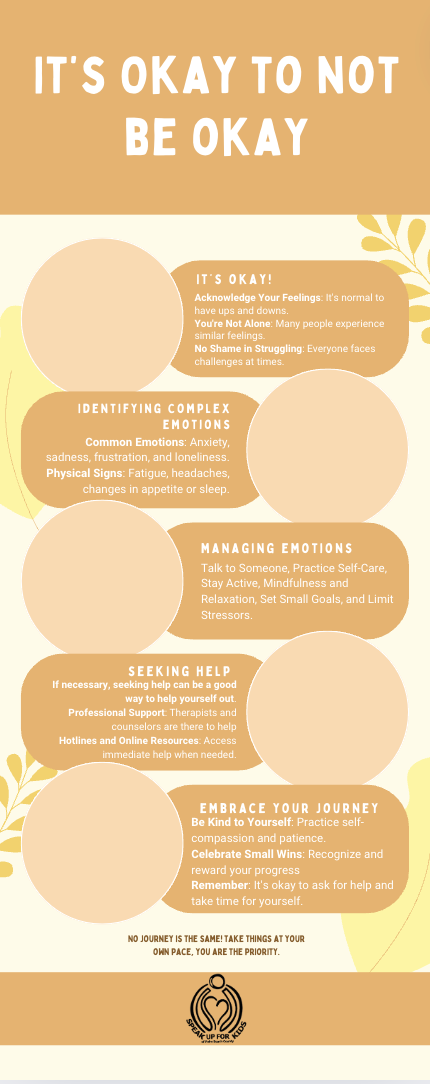It’s Okay to Not be Okay
Contributed by Speak Up for Kids Student Intern Team — This article was developed through the combined efforts of multiple student interns, each bringing unique skills and perspectives to support life skills education for foster youth.
Overview
Acknowledging that it's okay to not be okay is an important step towards mental and emotional well-being. Life can be challenging, and it's normal to experience periods of sadness, stress, or uncertainty. Understanding and accepting your feelings can help you navigate difficult times more effectively. Here’s a guide on how to cope with not being okay and what steps to take to manage your emotions and mental health.
Steps:
Acknowledge Your Feelings:
Recognize Emotions: Allow yourself to feel and recognize your emotions without judgment. It's normal to feel sad, anxious, or overwhelmed at times.
Validate Your Experience: Understand that your feelings are valid and that it's okay to not feel okay.
Talk About It:
Open Up: Share your feelings with someone you trust, such as a friend, family member, or therapist. Talking about your emotions can provide relief and perspective.
Seek Support: Reach out for support when needed. You don’t have to go through difficult times alone.
Practice Self-Care:
Take Care of Your Body: Ensure you are getting enough sleep, eating well, and engaging in physical activity. Physical health is closely linked to mental well-being.
Engage in Activities You Enjoy: Spend time doing things that make you happy and help you relax.
Limit Stressors:
Identify Stressors: Recognize the sources of stress in your life and see if there are ways to minimize or manage them.
Set Boundaries: Establish boundaries to protect your time and energy, and avoid taking on too much.
Seek Professional Help:
Therapy: Consider speaking with a mental health professional if you’re struggling to cope. Therapy can provide tools and strategies to manage your emotions.
Medication: In some cases, medication may be helpful. Consult with a healthcare provider to explore your options.
Practice Mindfulness and Relaxation:
Mindfulness: Engage in mindfulness practices, such as meditation or deep breathing, to stay grounded and present.
Relaxation Techniques: Use relaxation techniques like yoga, progressive muscle relaxation, or listening to calming music.
Stay Connected:
Social Connections: Maintain connections with friends and family. Social support is crucial for mental health.
Community: Join a support group or community organization where you can share experiences and gain support.
Key Questions:
What Am I Feeling Right Now?
Can I identify and name my emotions?
What might be causing these feelings?
Who Can I Talk To?
Is there someone I trust who I can share my feelings with?
How can I reach out for support?
How Can I Take Care of Myself?
What self-care activities can I incorporate into my daily routine?
How can I ensure I’m taking care of my physical and mental health?
What Are My Stressors?
What are the main sources of stress in my life?
How can I manage or reduce these stressors?
Do I Need Professional Help?
Would talking to a therapist or counselor be beneficial?
Should I consider discussing medication options with a healthcare provider?
What Mindfulness or Relaxation Techniques Work for Me?
Have I tried mindfulness practices like meditation or deep breathing?
What relaxation techniques help me feel calm and centered?
How Can I Stay Connected?
Who are the supportive people in my life I can reach out to?
Are there community groups or support networks I can join?
Tips:
Be Kind to Yourself: Treat yourself with the same compassion you would offer a friend in a similar situation.
Take One Day at a Time: Focus on getting through one day at a time rather than worrying about the future.
Celebrate Small Victories: Acknowledge and celebrate small accomplishments and steps forward, no matter how minor they may seem.
Avoid Self-Judgment: Remember that it's okay to have difficult days and that experiencing a range of emotions is part of being human.
Final Thoughts
By following these steps and asking the right questions, you can better cope with difficult emotions and understand that it's okay to not be okay. Embracing your feelings and seeking support when needed can lead to greater emotional resilience and overall well-being.


